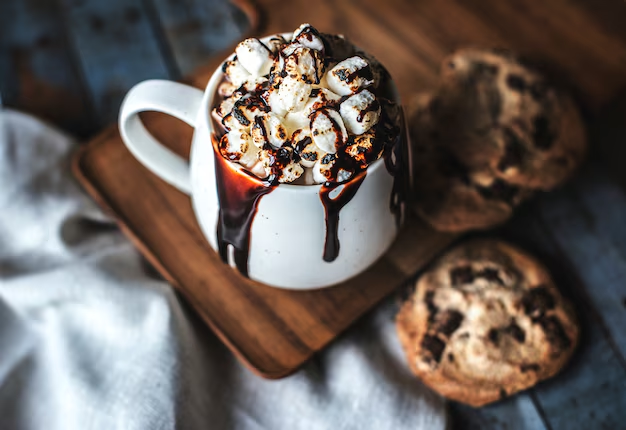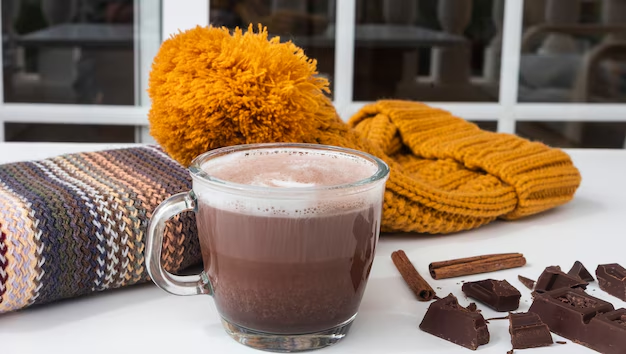Hot chocolate is a beloved comfort drink, often associated with cozy winter nights. But have you ever wondered, does hot chocolate have caffeine? While commonly considered caffeine-free, hot chocolate does contain a small amount of caffeine due to its cocoa content.
The caffeine levels are much lower than coffee or tea, but understanding its composition and effects can help you make informed choices. In this article, we’ll explore the basics of caffeine, the ingredients in hot chocolate, and how its caffeine content compares to other beverages. Let’s dive in.
What Is Caffeine?
Caffeine is a natural stimulant found in over 60 plant species, including coffee beans, tea leaves, and cocoa beans. It belongs to a class of compounds called methylxanthines and acts on the central nervous system. People consume caffeine to boost energy and improve alertness.
In moderate amounts, caffeine can enhance mental focus, but excessive intake may lead to negative side effects. Understanding its sources and how it affects the body is key to managing your consumption.
Common Sources of Caffeine
Caffeine is widely consumed worldwide, often in beverages like coffee, tea, and energy drinks. It’s also present in chocolate and some medications, such as pain relievers and weight-loss pills. Here are the main sources:
- Coffee: The most common source, with about 95 mg of caffeine per cup.
- Tea: Contains between 20-70 mg of caffeine per cup, depending on the type.
- Cocoa Products: Includes hot chocolate, milk chocolate, and dark chocolate.
- Energy Drinks: Often pack 50-300 mg of caffeine per serving.
Cocoa products like hot chocolate have a lower caffeine content compared to coffee and tea, making them a milder choice.
How Caffeine Works in the Body?
Caffeine works by blocking adenosine, a chemical in the brain that promotes sleepiness. This blockage increases the release of neurotransmitters like dopamine and norepinephrine, which elevate mood and energy levels. That’s why a cup of coffee or hot chocolate can help you feel more awake.
In moderate amounts, caffeine is generally safe and can improve concentration, memory, and even physical performance. However, excessive intake may cause:
- Insomnia
- Increased heart rate
- Anxiety
- Digestive issues
For individuals sensitive to it, even its small amounts can have noticeable effects.
The Composition of Hot Chocolate
Here is mentioned the composition of hot chocolate in detail.

Ingredients in Hot Chocolate
Hot chocolate typically consists of cocoa powder, milk, sugar, and sometimes cream. Store-bought mixes may include additional additives for flavor and texture.
Cocoa Powder or Chocolate Content
Cocoa powder, the primary ingredient in hot chocolate, is derived from cocoa beans, which naturally contain caffeine. Dark chocolate contains more caffeine than milk chocolate due to its higher cocoa content.
Additives in Store-Bought Mixes
Commercial hot chocolate mixes often include ingredients like:
- Sugar
- Stabilizers
- Artificial flavors
These additives do not affect the caffeine content but can alter the overall nutritional profile.
How Much Caffeine Is in Cocoa Beans?
Cocoa beans naturally contain about 0.1-0.7% caffeine by weight. A single tablespoon of cocoa powder may contain approximately 12 mg of caffeine. The caffeine levels vary depending on the type of cocoa and its processing.
Variations Between Milk and Dark Chocolate
Dark chocolate, with its higher cocoa concentration, contains more caffeine than milk chocolate. A 1-ounce serving of dark chocolate can have up to 20 mg of caffeine, while the same amount of milk chocolate has only about 5 mg.
How Much Caffeine Is in Hot Chocolate?
Let’s compare the caffeine content with different drinks.
Hot Chocolate vs. Coffee
Hot chocolate is a mild choice for those seeking a comforting drink with less caffeine. Here’s a comparison:
- Hot Chocolate: About 5-15 mg of caffeine per cup.
- Coffee: Approximately 95 mg of caffeine per cup.
Clearly, hot chocolate is far gentler on the caffeine scale than coffee.
Hot Chocolate vs. Tea
Tea generally has more caffeine, with black tea containing 40-70 mg per cup and green tea 20-45 mg. Herbal teas, however, are caffeine-free, making them a comparable alternative to hot chocolate.
Hot Chocolate vs. Energy Drinks
Energy drinks are designed to provide a caffeine boost, with 50-300 mg per serving. Hot chocolate, with its minimal caffeine, is a much less stimulating choice.
Factors Affecting Caffeine Content in Hot Chocolate
There are some factors that affect the caffeine content as discussed.
Homemade Recipes
The caffeine content in homemade hot chocolate depends on the type and amount of cocoa used. Recipes with dark chocolate or extra cocoa powder will have higher caffeine levels.
Instant Mixes and Branded Options
Pre-packaged chocolate mixes usually contain less caffeine than homemade versions. Brands often use lower cocoa percentages, reducing the caffeine content. Always check the label for detailed information.
Caffeine-Free Alternatives to Hot Chocolate
Here are options for the people looking for caffeine-free alternatives.
Decaffeinated Hot Chocolate Options
If you’re sensitive to caffeine or want a bedtime treat without the stimulant, decaffeinated options are perfect. These beverages are made using low-caffeine or cocoa-free ingredients, providing the same comforting experience without any unwanted effects.
Popular Brands Offering Caffeine-Free Choices
Several brands cater to caffeine-free preferences. Look for labels advertising “caffeine-free” or “carob-based” hot chocolate. Notable options include:
- Swiss Miss Caffeine-Free Mix: A popular choice for families.
- Land O’Lakes Cocoa Classics: Offers a variety of flavors, some without caffeine.
- Carob-Based Mixes: These use carob instead of cocoa for a chocolate-like flavor with no caffeine.
Recipes for Homemade Caffeine-Free Hot Chocolate
Making your own caffeine-free hot chocolate lets you control ingredients for a healthier, stimulant-free option.

Substitutes for Cocoa Powder
For caffeine-free versions, swap cocoa powder with carob powder. Carob mimics the chocolate flavor and is naturally caffeine-free. Here’s a quick recipe:
- Ingredients:
- 2 tablespoons carob powder
- 2 cups milk (or a dairy-free alternative)
- 1 tablespoon sugar or honey
- A pinch of cinnamon (optional)
- Instructions:
- Warm the milk in a saucepan.
- Mix the carob powder and sugar in a bowl.
- Gradually whisk the dry mix into the milk.
- Add cinnamon, stir, and serve warm.
This recipe offers a rich, satisfying alternative without the caffeine.
To Read: Chocolate Frosting Without Powdered Sugar Recipe
Benefits of Hot Chocolate
Hot chocolate isn’t just delicious—it can have some surprising health benefits.
Antioxidants in Cocoa
Cocoa is rich in flavonoids, a type of antioxidant that helps reduce inflammation and improves heart health. Drinking hot chocolate can boost your immune system and protect cells from damage caused by free radicals.
Mood-Boosting Properties
Hot chocolate can elevate your mood due to its phenylethylamine (PEA) content. This compound triggers the release of endorphins, the body’s natural “feel-good” chemicals. The warmth and sweetness also add to its comforting effect.
Potential Downsides
While hot chocolate has its perks, it’s not without drawbacks.
High Sugar Content
Most commercial hot chocolate mixes contain significant amounts of sugar, which can lead to weight gain, insulin resistance, and other health concerns if consumed excessively. Opt for unsweetened or low-sugar options to reduce these risks.
Allergens or Sensitivities in Mixes
Store-bought mixes often include milk, soy, or other additives that can trigger allergies or sensitivities. Always read ingredient labels carefully, especially if you have dietary restrictions or food allergies.
FAQs
Does Hot Chocolate Keep You Awake?
Hot chocolate is unlikely to keep you awake as it contains only trace amounts of caffeine. However, the sugar content might provide a temporary energy boost before settling into a more relaxed state.
Is Hot Chocolate Safe for Children or Pregnant Women?
Yes, hot chocolate is generally safe for children and pregnant women. Choose low-sugar, caffeine-free options to avoid excess sugar and stimulant effects, which may not be ideal for sensitive individuals.
What’s the Difference Between Hot Cocoa and Hot Chocolate?
Hot cocoa is made with cocoa powder, while hot chocolate uses melted chocolate, giving it a richer texture. Both contain caffeine, but hot chocolate usually has more due to the chocolate’s higher cocoa content.
Can You Make Hot Chocolate with Caffeine Boosters?
Yes, you can add caffeine boosters like espresso shots or matcha to hot chocolate for a customized drink. This blend combines the creaminess of hot chocolate with the energizing effects of caffeine.
How Does the Temperature of Hot Chocolate Affect Caffeine Levels?
The temperature of hot chocolate does not affect its caffeine levels. However, hotter beverages might make the caffeine absorption feel quicker due to increased blood flow during consumption.
Conclusion
Hot chocolate offers a comforting, lower-caffeine alternative to coffee and tea, with versatility in recipes to suit any preference. Whether you enjoy the subtle energy boost from cocoa or prefer caffeine-free options, this classic drink is adaptable to your needs. By exploring its benefits, downsides, and alternatives, you can make the most of your hot chocolate experience.

